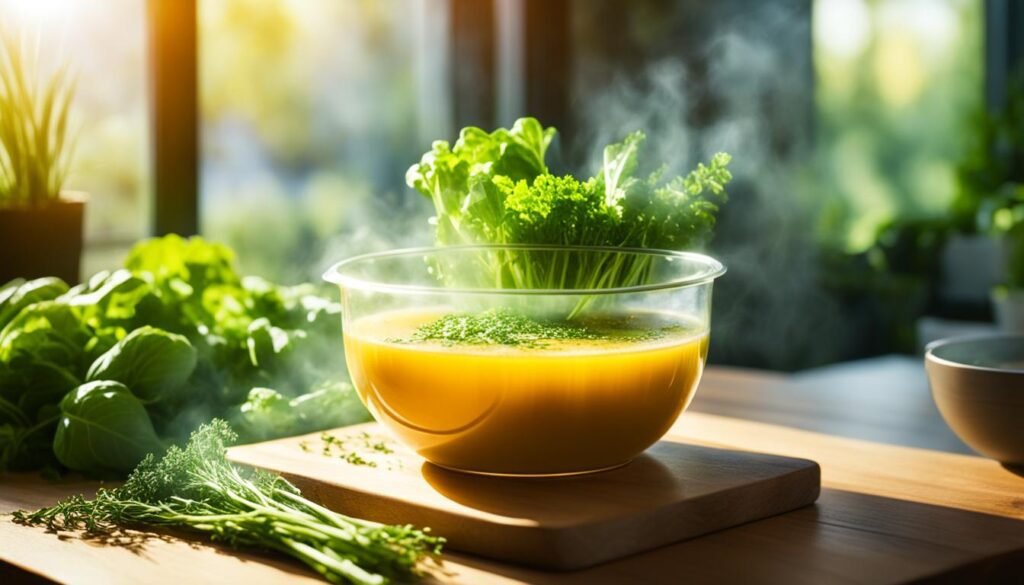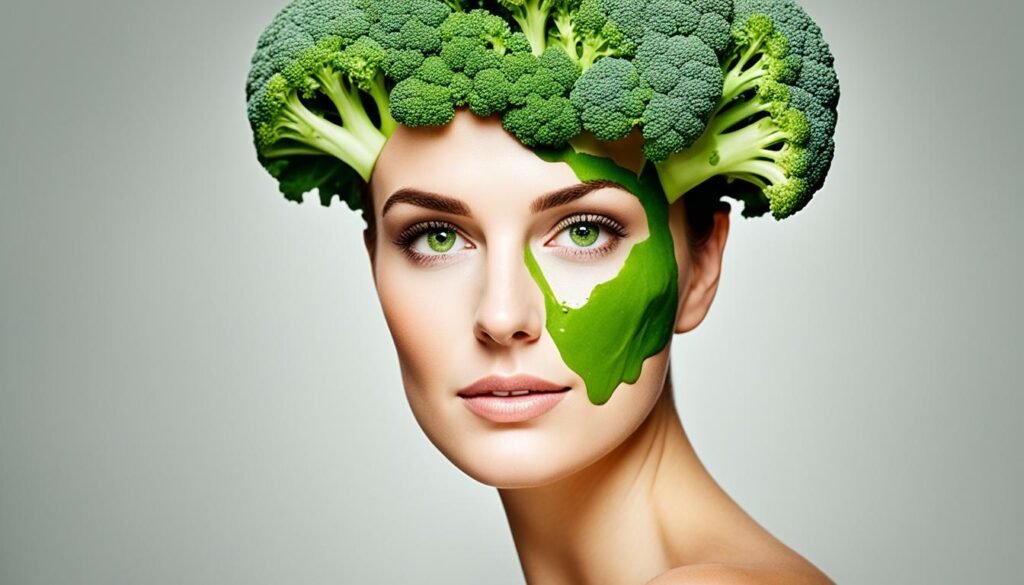Did you know that the key to achieving a radiant complexion doesn’t just lie in skincare products? It turns out that what you eat can have a major impact on the health and appearance of your skin. The right foods can promote a natural glow, improve skin moisture and elasticity, and even slow down signs of aging. So, if you’re looking for natural remedies for glowing skin, look no further than your kitchen!
When it comes to maintaining skin health, nutrition plays a crucial role. By incorporating skin-friendly foods into your diet, you can nourish your skin from the inside out, giving it the nutrients it needs to thrive. In this article, I will guide you through a variety of delicious and wholesome options that will help you achieve that coveted healthy and radiant glow.
Key Takeaways:
- Incorporating certain nutrients into your diet can improve the health and appearance of your skin.
- Your skin is influenced by your diet, and consuming a well-rounded, nutritious diet is important for skin health.
- Strawberries, kimchi, blood oranges, sunflower seeds, bone broth, organ meats, shellfish, broccoli, trout, and other specific foods can promote youthful, clear, and glowing skin.
- Choose high-quality, whole foods and maintain a balanced diet for optimal skin health.
- By taking care of your skin from the inside, you can achieve a natural and healthy glow that lasts.
The Importance of a Nutritious Diet for Skin Health
Your skin is your body’s largest organ, and its health is greatly influenced by the foods you consume. Just as a balanced diet benefits your overall health, it plays a vital role in maintaining the health and appearance of your skin. By incorporating skin-friendly foods into your daily meals, you can nourish your skin from the inside out and achieve a radiant complexion.
Consuming a well-rounded diet that includes nourishing foods for glowing skin can provide your body with the essential nutrients it needs to support healthy skin function. Some of these skin-friendly foods include:
- Foods rich in antioxidants like selenium, zinc, and vitamins A, C, and E
- Foods containing omega-3 fats for skin hydration and elasticity
These nutrients are crucial for protecting your skin against dehydration, loss of elasticity, and damage caused by sun exposure. They can also help slow down the signs of aging and improve the overall moisture and elasticity of your skin.
By following a radiant skin diet, you can nourish your skin with the necessary vitamins and minerals it needs to thrive. Let’s explore these nourishing foods for glowing skin and discover how they can enhance your skin health and promote a youthful complexion.
| Foods | Benefits |
|---|---|
| Strawberries | Rich in vitamin C for collagen production and protection against oxidative damage |
| Kimchi | Probiotics and nutrients that support gut and skin health |
| Blood Oranges | Anthocyanins for skin protection and anti-inflammatory effects |
| Sunflower Seeds | Vitamin E for skin protection and collagen synthesis |
| Bone Broth | Collagen for skin regeneration and hydration |
“A nutritious diet rich in skin-friendly foods can have a transformative effect on the health and appearance of your skin.”
By incorporating these skin-loving ingredients into your everyday meals, you can nourish your skin, support its natural functions, and unleash a vibrant, healthy glow. Stay tuned as we delve deeper into each of these skin-friendly foods and explore their specific benefits for your skin health.
Strawberries for Skin Health

When it comes to foods that contribute to healthy skin, strawberries are a delicious and nutritious option. These vibrant red berries are packed with skin-boosting nutrients that can help improve the health and appearance of your skin.
One of the key substances found in strawberries is vitamin C. This essential nutrient plays a crucial role in protecting skin cells from oxidative damage and promoting collagen production. Collagen is a protein that supports the structure and elasticity of the skin, making it crucial for maintaining a youthful complexion.
In fact, just one cup of sliced strawberries provides an impressive 108% of the Daily Value (DV) for vitamin C. This makes strawberries an excellent source of this skin-protective nutrient. Including strawberries in your diet can help ensure you meet your daily vitamin C needs and promote overall skin health.
But vitamin C is not the only beneficial component of strawberries. These berries also contain anthocyanins, phenolic acids, and flavonoids. These compounds have antioxidant and anti-inflammatory properties, which can further contribute to skin health by protecting against damage and soothing any existing inflammation.
So, whether you enjoy strawberries on their own, add them to smoothies, or incorporate them into salads and desserts, you can feel good about indulging in these flavorful fruits for the sake of your skin.
The Skin Benefits of Strawberries:
- Rich in vitamin C: Strawberries provide an abundance of vitamin C, which protects skin cells and promotes collagen production.
- Packed with antioxidants: The anthocyanins, phenolic acids, and flavonoids in strawberries have antioxidant properties, helping to combat oxidative stress and inflammation in the skin.
- Skin-soothing effects: The anti-inflammatory properties of the various compounds in strawberries may help calm skin irritation and redness.
So, why not savor the sweet and tangy flavor of strawberries while giving your skin a boost of essential nutrients?
Kimchi for a Healthy Gut and Skin
Maintaining a healthy gut is vital for promoting optimal skin health. One food that can benefit both your gut and skin is kimchi. Kimchi is a type of fermented dish that is rich in probiotics and essential nutrients for skin health.
Probiotics are beneficial bacteria that support a healthy gut microbiome. They aid in digestion, enhance nutrient absorption, and promote a balanced immune response. Research has shown that a diverse and thriving gut microbiome contributes to improved skin health and a reduction in conditions like acne and eczema.
Kimchi is not just a gut-friendly food; it also provides specific nutrients that are crucial for skin health. It contains provitamin A, which your body converts into vitamin A. Vitamin A is essential for maintaining the health of your skin cells, promoting cell turnover, and preventing premature aging.
Vitamin C, another important nutrient found in kimchi, is known for its antioxidant properties. It protects the skin against free radicals, boosts collagen production, and helps maintain skin elasticity and firmness.
So, how can you incorporate kimchi into your diet to reap its gut and skin health benefits? You can enjoy kimchi as a side dish, add it to salads, or use it as a topping for sandwiches and wraps. Its tangy and slightly spicy flavor adds a delicious twist to various dishes.
To summarize, including kimchi in your diet is a great way to promote a healthy gut and improve your skin health. The probiotics and beneficial nutrients found in kimchi work together to support a thriving gut microbiome and provide your skin with the essential components it needs to stay healthy and glowing.
Benefits of Kimchi for Gut and Skin Health
- Rich in probiotics that support a healthy gut microbiome
- Contains provitamin A, which promotes skin cell turnover and prevents premature aging
- Provides vitamin C, an antioxidant that protects the skin against free radicals and promotes collagen production
- Can be enjoyed as a side dish, added to salads, or used as a topping for sandwiches and wraps
Blood Oranges for Sun Protection

Blood oranges are a fantastic addition to your diet if you’re looking for natural ways to protect your skin from sun damage. These vibrant citrus fruits are not only delicious but also packed with health-boosting nutrients that can benefit your skin health.
One of the key components of blood oranges that make them so beneficial for the skin is their high concentration of anthocyanins. These powerful antioxidants are known for their protective properties against UV rays. They help shield your skin cells from damage caused by sun exposure, reducing the risk of sunburn, premature aging, and other harmful effects.
Anthocyanins also have anti-inflammatory effects, which can help soothe skin irritations and conditions, making blood oranges particularly useful for individuals dealing with inflammatory skin disorders like acne.
Furthermore, blood oranges are an excellent source of vitamin C, another essential component for healthy skin. Vitamin C promotes collagen production, which helps maintain the elasticity and firmness of the skin. It also acts as an additional shield against UV damage by neutralizing free radicals.
Adding blood oranges to your diet is a simple and enjoyable way to enhance your skin’s defense against harmful sun exposure. Whether you enjoy them as a refreshing snack, in fruit salads, or as a glass of freshly squeezed juice, blood oranges can contribute to your overall skin health.
Sunflower Seeds for Skin Health
When it comes to maintaining healthy skin, sunflower seeds are a top choice. These small but mighty seeds are packed with essential nutrients that promote skin health and vitality.
Packed with Vitamin E
One of the standout benefits of sunflower seeds is their high content of vitamin E, a powerful antioxidant that offers immense protection for the skin. Vitamin E shields the skin cells from sun damage and oxidative stress, reducing the risk of premature aging, wrinkles, and fine lines. It also helps to regulate inflammation, promoting a calm and balanced complexion.
Furthermore, vitamin E is essential for collagen synthesis, a protein that gives skin its structure and elasticity. By supporting collagen production, sunflower seeds contribute to a firm and youthful appearance.
An Abundance of Minerals
In addition to vitamin E, sunflower seeds are rich in minerals like selenium and zinc, which are vital for maintaining healthy skin. Selenium acts as an antioxidant, protecting the skin from free radicals and preventing cell damage. It also aids in maintaining skin elasticity and reducing inflammation.
Zinc plays a crucial role in regulating oil production, preventing acne breakouts. It also helps in wound healing and supports the skin’s natural barrier function, keeping it healthy and protected.
By incorporating sunflower seeds into your diet, you can provide your skin with the necessary nutrients to thrive.
“Sunflower seeds are a fantastic addition to any skin care routine. Their vitamin E content helps protect the skin from damage, and the minerals found in these seeds contribute to overall skin health.”
| Nutrient | Amount per 100g |
|---|---|
| Vitamin E | 35.17 mg |
| Selenium | 53 µg |
| Zinc | 5 mg |
Table: Nutritional content of sunflower seeds per 100g.
Bone Broth for Skin Regeneration

Collagen plays a significant role in skin health, providing the necessary building blocks for skin regeneration. And when it comes to collagen, bone broth is a rich source that can benefit your skin in numerous ways.
Bone broth is made by simmering animal bones, such as beef or chicken, for an extended period. This slow cooking process extracts collagen, minerals, and amino acids from the bones, resulting in a nutrient-dense liquid that supports skin health.
Collagen, the main protein in bone broth, contains essential amino acids like glycine, proline, and lysine. These amino acids are necessary for collagen synthesis, which helps improve skin elasticity, firmness, and moisture retention.
Adding bone broth to your diet can provide the necessary nutrients your skin needs to repair and regenerate its cells. Its high collagen content can help restore and maintain youthful-looking skin. Additionally, bone broth helps hydrate the skin, keeping it plump, healthy, and glowing.
If you’re looking to include bone broth in your skincare routine, consider sipping on a cup of bone broth regularly. This simple habit can have a positive impact on your skin health and contribute to the overall well-being of your skin.
Benefits of Bone Broth for Skin Health:
- Promotes collagen synthesis
- Improves skin elasticity and firmness
- Enhances skin moisture retention
- Supports skin regeneration and repair
- Hydrates the skin
- Contributes to a healthy, glowing complexion
How to Incorporate Bone Broth into Your Diet
There are various ways to incorporate bone broth into your daily routine:
- Sip it as a warm, comforting beverage.
- Use it as a base for soups, stews, and sauces.
- Add it to your favorite recipes in place of regular broth or water.
- Use it as a cooking liquid for grains like rice or quinoa for added flavor and nutritional benefits.
Remember to choose organic, high-quality bone broth, or make your own at home using organic, grass-fed animal bones. This ensures that you’re getting the best possible nutrients and minimizing the intake of additives or chemicals.
| Collagen Content | Other Nutrients |
|---|---|
| Rich in collagen, providing amino acids essential for skin health | Minerals like calcium, magnesium, and phosphorus |
| Supports skin regeneration and repair | Beneficial amino acids glycine, proline, and lysine |
| Contributes to improved skin elasticity and firmness | Hydrating and nourishing properties |
Organ Meats for Nutrient-Dense Skin Support

When it comes to maintaining healthy skin, incorporating organ meats into your diet can be highly beneficial. Organ meats, such as liver and heart, are not only nutrient-dense protein sources, but they also provide essential vitamins and minerals that support skin health.
Let’s take a closer look at beef liver, for example. It is a powerhouse of nutrients that can do wonders for your skin. Rich in protein, copper, selenium, vitamin A, and zinc, beef liver offers a wide range of benefits for maintaining youthful and radiant skin.
Protein: Protein is essential for the growth and repair of skin cells. It helps in improving skin elasticity and preventing sagging, making your skin look firm and youthful.
Copper: Copper plays a vital role in collagen synthesis, a protein that gives your skin structure and strength. It also aids in the production of melanin, the pigment responsible for your skin color.
Selenium: Selenium is a powerful antioxidant that protects your skin against free radicals. It helps in preserving skin elasticity and preventing signs of aging like fine lines and wrinkles.
Vitamin A: Vitamin A is essential for maintaining healthy skin cells. It promotes the production of new skin cells, helps in the healing process, and reduces the risk of acne and other skin conditions.
Zinc: Zinc is involved in collagen maturation, ensuring that the collagen fibers in your skin are strong and healthy. It also has anti-inflammatory properties that can improve skin conditions like acne and eczema.
Incorporating organ meats into your diet can provide you with these vital nutrients that support the health and appearance of your skin. Whether you enjoy liver pâté, grilled heart, or other organ meat dishes, you’ll be nourishing your skin from the inside out.
Shellfish for Healthy, Glowing Skin

When it comes to promoting healthy, glowing skin, shellfish is a top choice. Oysters, clams, and mussels are all delicious options that offer numerous benefits for your skin. These seafood options are rich in essential minerals like zinc, selenium, and copper, which play a vital role in supporting skin health and regulating inflammation.
Zinc, in particular, is known for its skin-protecting properties. It helps to regulate sebum production, reduce inflammation, and promote wound healing. Selenium, on the other hand, acts as a powerful antioxidant that protects your skin cells from oxidative stress and other environmental damage.
Not only are shellfish rich in minerals, but they also provide omega-3 fats, which have anti-inflammatory effects and contribute to the overall function and structure of your skin.
“Incorporating shellfish into your diet can give your skin a natural glow while providing it with the nutrients and protection it needs to stay healthy and youthful-looking.”
Adding oysters, clams, or mussels to your meals can be a tasty way to nourish your skin. Whether enjoyed raw, grilled, or incorporated into a savory seafood dish, shellfish offer a range of flavors and textures to suit your palate.
The Benefits of Shellfish for Skin Health
Shellfish, such as oysters, clams, and mussels, provide a range of benefits for your skin:
- Rich in minerals: Zinc, selenium, and copper are essential minerals that support skin health and regulate inflammation.
- Protects against oxidative stress: Selenium acts as a potent antioxidant, protecting your skin cells from damage caused by free radicals.
- Supports skin structure: Omega-3 fats contribute to the overall function and structure of your skin, promoting elasticity and moisture.
Including shellfish in your diet can help improve the overall health and appearance of your skin. Just remember to source them from reputable suppliers and consume them as part of a balanced diet.
Broccoli for Skin Protection

As I mentioned earlier, a healthy gut environment is essential for maintaining healthy skin. One vegetable that can support this is broccoli. Not only is broccoli a fiber-rich vegetable, but it also provides numerous benefits for your skin.
Broccoli is packed with vitamin C, which is crucial for collagen production and protecting the skin against free radicals. It also contains polyphenol antioxidants, which have been shown to protect the skin from UV damage and provide anti-inflammatory effects.
Furthermore, beta-carotene, another compound found in broccoli, promotes skin regeneration and improves blood circulation and elasticity. All these properties make broccoli an excellent addition to your diet for skin health and protection.
Including broccoli in your meals can provide the necessary nutrients your skin needs to stay healthy and lower the risk of skin cancer. So, make sure to incorporate this superstar vegetable into your diet for glowing, protected skin.
Trout for Vitamin D and Skin Health

Trout is a fantastic addition to your diet for promoting skin health. With its high content of vitamin D, trout provides essential support for the growth of skin cells and the functioning of the skin barrier. Vitamin D is known to regulate inflammation and boost the skin’s immune system, guarding against harmful pathogens and substances that can damage the skin.
Consuming trout offers numerous benefits for maintaining healthy skin. In addition to vitamin D, trout is rich in zinc, selenium, protein, and omega-3 fats. Zinc aids in collagen production, while selenium plays a vital role in antioxidant defense and maintaining skin elasticity. Protein provides the necessary building blocks for skin repair and rejuvenation, while omega-3 fats offer anti-inflammatory effects that contribute to overall skin health.
Including trout in your diet can not only nourish your body with essential nutrients but also help protect against skin cancer and inflammatory skin conditions. By incorporating this flavorful fish into your meals, you can support improved skin health and enjoy the advantages of its rich vitamin and mineral content.
Trout Nutritional Information
| Nutrient | Amount per 100g |
|---|---|
| Calories | 119 |
| Protein | 23g |
| Fat | 2.4g |
| Vitamin D | 18.7mcg (93.5% DV) |
| Zinc | 0.82mg (7.5% DV) |
| Selenium | 31.3mcg (56.8% DV) |
| Omega-3 Fats | 0.4g |
Source: United States Department of Agriculture, National Nutrient Database
Conclusion
Achieving youthful, clear, and glowing skin starts from within, and a healthy diet plays a crucial role in skin health. By incorporating nutrient-rich foods into your daily meals, you can nourish your skin and enhance its appearance naturally. Strawberries, kimchi, blood oranges, sunflower seeds, bone broth, organ meats, shellfish, broccoli, trout, and other skin-promoting foods are packed with the necessary nutrients, antioxidants, and vitamins to support your skin’s health and radiance.
These foods provide essential components like vitamin C, which protects against oxidative damage and promotes collagen production, and vitamin D, which supports skin cell growth and the skin’s immune system. They also offer a range of minerals such as zinc, selenium, and copper, which promote skin health, reduce inflammation, and protect against harmful environmental factors.
For best results, opt for high-quality, whole foods and maintain a balanced diet. Remember that healthy skin is a reflection of overall well-being, so make sure to choose a variety of skin-promoting foods and avoid excessive intake of processed or sugary items. By nourishing your body with the right foods, you can achieve the youthful, clear skin and glowing complexion you desire.
FAQ
Are there any foods that can promote glowing skin naturally?
Yes, there are foods that promote glowing skin naturally. Certain nutrients found in food can protect the skin, slow signs of aging, and improve skin moisture and elasticity.
What is the importance of a nutritious diet for skin health?
A nutritious diet is essential for maintaining healthy skin. Consuming a well-rounded diet that includes skin-friendly foods can protect the skin from dehydration, loss of elasticity, and damage caused by sun exposure. It can also slow signs of aging and improve skin moisture and elasticity.
How can strawberries contribute to skin health?
Strawberries are packed with skin health-promoting substances, including vitamin C, anthocyanins, phenolic acids, and flavonoids. Vitamin C protects skin cells from oxidative damage and is essential for collagen production, making strawberries an excellent source of this skin-boosting nutrient.
What is the role of kimchi in maintaining a healthy gut and skin?
Kimchi is rich in probiotics and nutrients required for optimal skin health. It contains provitamin A, vitamin C, and beneficial bacteria that support gut and skin health. Including kimchi in your diet can help improve your skin by promoting a healthy gut.
How can blood oranges benefit the skin?
Blood oranges are a rich source of antioxidants called anthocyanins, which protect skin cells from damage caused by UV rays and have anti-inflammatory effects. They also provide a high amount of vitamin C, which supports collagen production and protects skin cells against UV damage.
How do sunflower seeds contribute to skin health?
Sunflower seeds are packed with protein and vitamin E, both of which are essential for skin health. Vitamin E protects skin cells from sun damage, regulates inflammation, and contributes to collagen synthesis. Sunflower seeds are also high in selenium and zinc, minerals that play important roles in maintaining skin health.
What are the benefits of bone broth for skin regeneration?
Bone broth is rich in collagen, which provides the amino acids necessary for collagen synthesis. Consuming bone broth can help hydrate the skin and provide the nutrients it needs to repair and regenerate its cells, contributing to skin health.
How can organ meats support skin health?
Organ meats, such as liver and heart, are highly nutrient-dense protein sources that provide vitamins and minerals essential for maintaining skin health. These nutrients protect the skin against free radicals, contribute to collagen maturation and skin cell growth, and support overall skin health.
What are the benefits of shellfish for healthy, glowing skin?
Shellfish, including oysters, clams, and mussels, are excellent choices for promoting healthy, glowing skin. They are rich in minerals like zinc, selenium, and copper, which support skin health and regulate inflammation. Shellfish also provide omega-3 fats, which have anti-inflammatory effects and contribute to skin function and structure.
How can broccoli contribute to skin protection?
Broccoli is a fiber-rich vegetable that supports a healthy gut environment, which is vital for maintaining healthy skin. It is high in vitamin C, polyphenol antioxidants, and beta-carotene. These compounds protect the skin against UV damage, provide anti-inflammatory effects, accelerate skin regeneration, and improve blood circulation and elasticity.
What is the role of trout in skin health?
Trout is a great source of vitamin D, which is essential for skin cell growth and the functioning of the skin barrier. Vitamin D also regulates inflammation and supports the skin’s immune system, protecting it against pathogens and other harmful substances. Consuming trout can provide vitamin D, zinc, selenium, protein, and omega-3 fats, all of which contribute to healthy skin.




